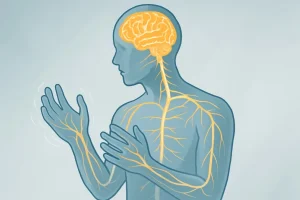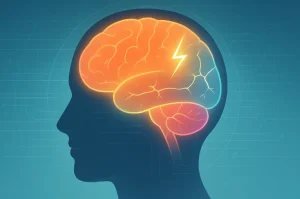Have you ever experienced your hands trembling, your legs twitching, or your whole body shaking without understanding why? You’re not alone. Many people report occasional or persistent body shaking, often with no obvious trigger. These episodes can be mild and fleeting or more frequent and disruptive.
So, what could cause this? In many cases, body shaking is due to temporary factors such as stress, fatigue, caffeine consumption, or mild illness. But in some instances, persistent or severe tremors may point to an underlying medical condition that requires diagnosis and treatment.
Understanding the difference between what’s normal and what’s not is essential in recognising when to seek help.
What Exactly Is a Tremor, and How Does It Affect the Body?

A tremor is defined as an involuntary, rhythmic shaking or trembling movement of one or more parts of the body. It is considered a symptom rather than a standalone condition and can vary in intensity, duration, and location.
Most people have a slight tremor, referred to as a physiologic tremor, which is usually unnoticed and becomes more apparent during stress, exhaustion, or after consuming stimulants like caffeine.
Tremors can affect any body part but are most commonly noticed in the hands. They may also involve the arms, legs, head, voice, or torso. In severe cases, tremors may interfere with routine tasks like eating, writing, or dressing.
Healthcare professionals categorise tremors based on when and how they appear. The two main types are:
| Type of Tremor | Description |
| Resting Tremor | Occurs when the affected body part is at rest and supported against gravity. Often associated with Parkinson’s disease. |
| Action Tremor | Happens during voluntary movement. Includes subtypes such as postural, kinetic, and isometric tremors. |
Each type provides clues about the possible underlying cause and guides the direction for treatment.
Could Temporary Factors Be Causing My Body to Shake?
Yes, in many cases, body shaking is linked to everyday triggers that are not harmful and often resolve without medical treatment. These include physical, emotional, and environmental factors.
One of the most common causes is emotional stress. When you’re anxious or scared, your nervous system releases adrenaline. This can result in trembling hands, rapid breathing, and increased heart rate.
Likewise, intense anger or emotional excitement can produce similar effects. Another frequently overlooked factor is fatigue. When your body is overtired, muscles may struggle to stay steady, causing shaking, especially during fine motor tasks.
Cold environments can also trigger shaking. This is the body’s natural response to low temperatures known as shivering aimed at producing heat. Similarly, a mild infection or fever can cause chills or body tremors as the immune system attempts to regulate body temperature.
Stimulants like caffeine and energy drinks can overstimulate the nervous system, leading to hand tremors. On the other hand, alcohol withdrawal, particularly after prolonged or heavy use, can result in severe body shaking, typically within hours of the last drink.
Low blood sugar, medically referred to as hypoglycaemia, may also cause shakiness. This occurs when glucose levels in the blood drop too low, depriving the brain and muscles of energy. It can result in trembling, sweating, dizziness, and confusion.
Although these causes are usually temporary and manageable, they can be distressing, especially if the shaking is persistent or worsens over time.
When Should I Be Concerned About Frequent or Severe Shaking?

Not all shaking is harmless. While occasional tremors due to lifestyle or environmental factors are common, certain warning signs should prompt a medical evaluation.
If the shaking:
- Interferes with daily tasks such as eating, writing, or walking
- Occurs frequently or is worsening over time
- Affects multiple parts of the body
- Happens when you’re at rest or asleep
- Is accompanied by other symptoms such as muscle weakness, coordination problems, or changes in mental state
…it is advisable to see a doctor.
These may indicate a neurological or systemic condition that needs timely diagnosis and management. In many cases, early intervention can improve outcomes and prevent the progression of symptoms.
Which Medical Conditions Can Cause Involuntary Body Shaking?
There are several underlying medical conditions where body tremors are either a primary symptom or a secondary complication. Some of the most common include:
Essential Tremor
This is the most prevalent movement disorder, affecting millions of people worldwide. Essential tremor usually presents as a rhythmic shaking in the hands during movement, such as writing or lifting a glass.
It can also affect the voice, head, and, in some cases, the legs. Although the condition is not life-threatening, it can become progressively worse and interfere with daily functioning.
Hyperthyroidism
When the thyroid gland becomes overactive, it speeds up the body’s metabolism. Symptoms may include weight loss, rapid heartbeat, nervousness, and shaking hands. The tremor results from increased sensitivity to adrenaline and overactivity of the nervous system.
Parkinson’s Disease
Tremor is one of the earliest and most noticeable symptoms of Parkinson’s disease. Unlike essential tremor, Parkinsonian tremors typically occur when the body is at rest and may initially appear in just one hand or leg. Over time, the condition can also affect posture, movement, and coordination.
Multiple Sclerosis (MS)
MS is an autoimmune condition where the immune system attacks the protective covering of nerves. Depending on the areas of the nervous system affected, it can cause a range of symptoms, including muscle tremors, imbalance, fatigue, and vision problems.
Medication-Induced Tremor
Certain medications are known to cause or exacerbate tremors. Examples include:
| Medication Type | Examples |
| Antidepressants | Fluoxetine (Prozac) |
| Asthma medications | Salbutamol |
| Antipsychotics | Risperidone, Olanzapine |
| Stimulants | Methylphenidate (Ritalin) |
| Mood stabilisers | Lithium |
| Corticosteroids | Prednisone |
If you notice a new or worsening tremor after starting a medication, consult your healthcare provider for possible alternatives.
Can Tremors Be a Sign of Brain Injury or Damage?

Tremors may occur following injury to the brain due to trauma, stroke, or tumour growth. This kind of damage can disrupt the areas responsible for muscle control, such as the cerebellum or basal ganglia.
Cerebellar tremors, for example, are slow and large-amplitude tremors that worsen at the end of a voluntary movement. They are often caused by stroke, multiple sclerosis, or long-term alcohol abuse.
In contrast, dystonic tremors are irregular and usually present with other abnormal postures or movements. These result from damage in specific parts of the brain and may be more resistant to treatment.
How Do Doctors Diagnose the Cause of Tremors?
Diagnosis starts with a detailed medical history and physical examination. The healthcare provider will assess:
- The pattern and timing of the tremor (at rest or during movement)
- The body parts affected
- Factors that worsen or improve the tremor
- Any accompanying symptoms
A neurological examination is usually performed to evaluate reflexes, coordination, balance, and muscle strength. Depending on the suspected cause, further tests may include:
- Blood tests to check thyroid function, blood sugar, and nutrient levels
- Urine tests to detect toxins or substances
- Imaging studies like MRI or CT scans to assess brain structure
- Nerve conduction studies or EMG for muscle and nerve activity
Accurate diagnosis is crucial as treatment varies significantly depending on the underlying cause.
What Treatments Are Available for Tremors?
Treatment depends on the type and cause of the tremor. Some tremors, especially those due to medications or metabolic conditions, may resolve once the trigger is addressed. Others, such as essential tremor or Parkinsonian tremor, require ongoing management.
| Tremor Type | Common Treatments |
| Essential Tremor | Beta-blockers (e.g. propranolol), primidone, Botox injections, deep brain stimulation |
| Parkinsonian Tremor | Levodopa, dopamine agonists, physical therapy |
| Hyperthyroid Tremor | Antithyroid medications, beta-blockers |
| Dystonic Tremor | Botulinum toxin injections, physiotherapy |
| Functional Tremor | Psychotherapy, occupational therapy, stress management |
| Medication-Induced | Adjusting or switching medication under medical guidance |
How Can Tremors Be Managed at Home?

While medical treatment plays a vital role, several self-care strategies can help individuals manage symptoms and improve quality of life. These include:
- Reducing or eliminating stimulants, especially caffeine and alcohol
- Practising relaxation techniques such as mindfulness or breathing exercises
- Ensuring adequate sleep to prevent fatigue-related tremors
- Using assistive tools like weighted utensils or adaptive clothing
- Keeping a symptom diary to track triggers and treatment responses
- Joining support groups for emotional support and shared coping strategies
These measures may not eliminate the tremor but can significantly improve independence and day-to-day functioning.
When Should Someone See a Doctor for Tremors?
It is recommended to consult a healthcare provider if:
- The tremor is new and unexplained
- It has been worsening over time
- It interferes with work, self-care, or social activities
- You develop additional neurological symptoms, such as difficulty speaking, memory issues, or imbalance
- The tremor causes emotional distress or anxiety
Even if the tremor turns out to be benign, understanding the cause can provide peace of mind and help you manage it more effectively.
Frequently Asked Questions
Can stress alone cause persistent shaking?
Yes. Chronic stress can cause sustained body trembling, especially if not addressed through lifestyle changes or therapy.
Is it normal to shake slightly when holding out your hands?
Yes, a mild physiologic tremor is normal and often unnoticed unless amplified by fatigue or caffeine.
Can dietary changes reduce shaking?
In some cases, correcting vitamin or mineral deficiencies (such as magnesium or B12) can help reduce symptoms.
Are tremors a natural part of ageing?
Tremors can become more noticeable with age due to natural changes in muscle and nerve function.
How long do medication-induced tremors last?
These usually resolve once the medication is discontinued, but the timeline depends on the drug and individual response.
Do tremors always indicate a serious health issue?
No. Many tremors are benign and related to temporary factors. However, persistent or severe symptoms should be evaluated.
Is there a cure for essential tremor?
There is no cure, but treatments like medications, injections, and surgical options can effectively manage symptoms.






